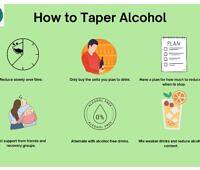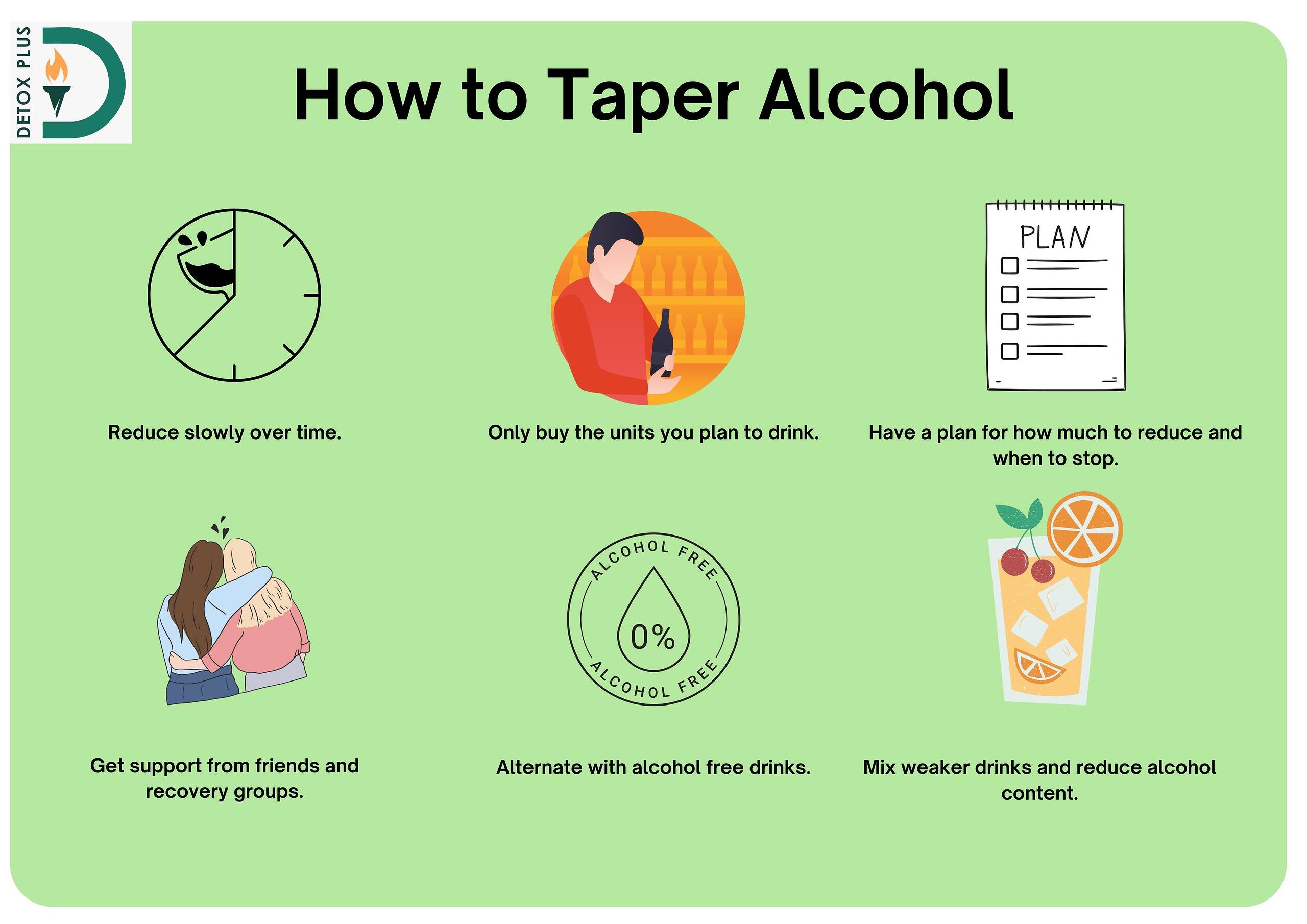
How to Taper Off Alcohol
Best Way to Stop Drinking
Stopping drinking can be challenging, but there are several ways to make it easier and safer. Tapering alcohol is one way to reduce symptoms, but it isn’t without risks.

Stopping Alcohol Cold Turkey
Most people have heard of going cold turkey in the context of alcohol, but in other areas, anything from caffeine to recreational drugs. It is considered the toughest way to stop taking something, but is it the best?
Cold turkey works if you have no other option, such as serious and immediate health or personal issues.
It is also a reasonable option for people who drink too much but have mild withdrawal symptoms. The general rule is that if you are drinking more than 30 units of alcohol a day or have a history of severe withdrawal symptoms, then going cold turkey is dangerous. If you drink between 15 and 30 units per day and have never had serious withdrawal symptoms before, you may be able to stop immediately without risk to your health.
Tapering may not be for you if you experience severe withdrawal symptoms or cravings that cause you to start drinking again.
When Doesn’t Cold Turkey Work?
It might work for you; you never know until you try. However, there are signs that it is not the best option for you:
- Severe Withdrawal: insomnia, tremors, seizures, hallucinations or depression
- Relapse and return to drinking
- Strong Cravings
- Repeated attempts and failures to quit
In conclusion, cold turkey is uncomfortable and dangerous to your health. It is still better than continuing to drink, though, and you should give it serious consideration if you don’t think tapering or medical detox is an option.
How to Taper off Alcohol
Unlike cold turkey, tapering involves taking smaller and smaller amounts of alcohol over a set period. The end goal is to stop drinking entirely.
This is easier from the point of view of withdrawal effects such as insomnia, shaking, seizures and hallucinations. It may not help with other withdrawal symptoms like depression and anxiety.
One of the hardest parts of tapering is cravings for alcohol are made worse, and your ability to control yourself is reduced when you are under the influence of alcohol.
Does Tapering Help Cravings?
This depends on the cause of the craving, but in general, the answer is no. You might feel temporary relief from giving in, but alcohol reduces your inhibitions and self-control.
Physical cravings caused by low levels of GABA and other neurotransmitters may be temporarily eased by drinking. However, the more you drink, the fewer these positive chemicals are produced. Long-term, drinking alcohol excessively will continue to lower these levels, and your recovery will be slower.
Habit is another common cause of cravings for alcohol. Tapering does not help with this craving, especially if you continue drinking within your habits.
Changing your circumstances can help here. You could try managing your symptoms at home if you normally drink and stay out late at night with a group.
The opposite is true. Those who sit and drink alone might manage symptoms with a couple of drinks with a close, supportive friend or family member to monitor and keep them accountable.
An emotion or experience triggers the final type of craving. This is where something reminds you of why you drank so much and causes you to relapse.
It can be anything from a memory of feeling less anxious in social situations to how you used alcohol to deal with emotional or psychological trauma. Either way, alcohol reminds you of drinking and weakens your resolve, worsening this craving.
Tapering vs Cold Turkey
If you are wondering about the important difference between tapering and cold turkey, it is that cold turkey risks dangerous withdrawal symptoms and relapsing to drinking again.
The two have one thing in common: they need strong willpower and carry significant risks to your mental and physical health. It is worth remembering that both are better than continuing excessive drinking. Cold turkey means stopping completely and suddenly with no medical help. It can be a tough option, but in some cases, it is the best choice.
Especially if you have no choice but to stop immediately, it may be best to try a medical detox, as it can be dangerous to stop drinking suddenly when you have been drinking too much for a long period.
Tapering carries its risks. Slowly weaning off alcohol may reduce withdrawal symptoms, but it increases the chances of relapse.
Stopping Alcohol Safely
If you are not experiencing withdrawal symptoms or severe cravings when you stop drinking, then a program of self-care and support groups may be all you need. This option is better than tapering because it can lead you back to temptation. If there is no physical reason for tapering, it is best avoided.
The safest way to stop drinking alcohol if you are experiencing withdrawal symptoms or alcohol cravings is a medical detox. Although they can be hard to get from the NHS, a private doctor from a specialist clinic may be able to help you.
A range of medications are available to ease symptoms and cravings for alcohol. You can even detox at home if you are able. Sometimes, you may need to go into a rehab or detox facility where a medical detox will be included in your package.
Weaning Myself Off Alcohol
Although weaning yourself off alcohol is not the ideal way to stop drinking, sometimes there is no other option. If you cannot get a medical detox or attend a rehab centre and your GP won’t offer a prescription, you may need to wean yourself slowly to avoid symptoms. There are some ways you can improve your chances of weaning yourself off alcohol.
Make a Plan
Cutting down slowly comes with a lot of risk that you will keep drinking large amounts once you start. To avoid this, a plan for how many units you want to cut every day can be helpful. You can test how little alcohol you can drink before you start getting withdrawal symptoms. You can use an alcohol tapering calculator and track your intake manually or with an app.
Be Accountable
Share your plan with someone supportive and sober. A close friend or family member might be able to help you.
You can speak to local recovery groups if you do not have anyone. There will likely be sponsors and people with experience in tapering alcohol.
Write down how many units you have drunk daily, and try not to exceed your planned amount. Only buying the amount of alcohol you plan to drink can improve your chances of succeeding.
Get Support
Local meetings of support groups for those with drug and alcohol problems can be a source of stability and emotional security. Counselling either online or in person can help you understand why you are drinking in a damaging way and supports long-term recovery.

